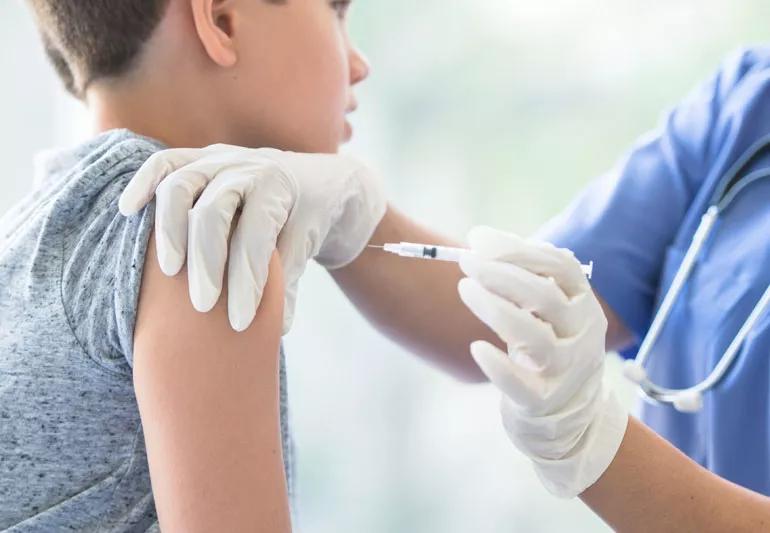Don't lose sight of the other health threats children face

Image content: This image is available to view online.
View image online (https://assets.clevelandclinic.org/transform/abf93840-147e-46ab-895b-4b3c56284a36/childVaccine-1201311282-770x533-1_jpg)
child getting vaccinated
This article was updated on January 29, 2021, to reflect new information about this rapidly evolving situation. Originally published May 19, 2020
Advertisement
Cleveland Clinic is a non-profit academic medical center. Advertising on our site helps support our mission. We do not endorse non-Cleveland Clinic products or services. Policy
The ongoing COVID-19 (coronavirus) pandemic has made it difficult to keep up with routine health maintenance, whether that’s non-essential surgery, going to the emergency room or regular visits to your primary health care provider.
Given the outbreak, it’s understandable there are a lot of questions about where it’s safe to go and if certain offices are even open. And one area of concern pertains to vaccinations of young children.
Fears over COVID-19 infections plus broad and varying “stay-at-home” orders across many states have resulted in a reported decrease in children receiving routine, essential immunizations.
Pediatrician Kimberly Giuliano, MD, points out, “Since the onset of the pandemic, national data shows there’s been from a 42 to 73% decline in vaccination rates, depending on the source and vaccine type.”
Missing these routine vaccinations, though, can be harmful for children, leaving them exposed to numerous other illnesses that carry more risks for them than COVID-19, including measles.
We spoke with pediatrician Skyler Kalady, MD, about those risks, concerns over COVID-19, and why parents should make sure their children stay updated on their vaccinations.
While children are at risk for COVID-19, Dr. Kalady says, “Fortunately, studies show that most children who develop COVID-19 have a relatively mild course of illness, or are even asymptomatic, compared to adults.”
Advertisement
She adds that parents should continue to prioritize getting their children their routine vaccinations in spite of anxieties over COVID-19.
“Vaccine preventable illness are present in our community. It’s really important that we don’t lose sight of these real health threats,” she says. “If children are not vaccinated, they are at high risk for developing those vaccine preventable illnesses, including measles and pertussis (whooping cough).”
The concern about exposing children to COVID-19 is understandable, says Dr. Kalady, but she notes the efforts that are being made to create the safest possible environment for these young patients.
“We have developed processes following recommendations from a state’s Department of Health to provide safe essential care to our patients while limiting risk of exposures. By keeping patients up to date on their vaccines, we can avoid creating a surge in vaccine-preventable illnesses.”
The American Academy of Pediatrics has supported the ongoing preventative care for children as essential, Dr. Kalady says, and Cleveland Clinic is following these recommendations for creating safe ways for children to get vaccinated on schedule, especially for children under 30 months.
“We’ve worked very carefully to identify safe and effective ways to give our most vulnerable patients their vaccines on time by not exposing them to sick people,” she says. “Everyone is screened before entering our facilities to make sure they don’t have a temperature or cough. If they do have these symptoms, they are advised to return at another time.”
Additionally, she says, offices have reoriented their focus to provide virtual visits to patients whenever appropriate which, in turn, keeps traffic at their offices lower and provides a safer environment to bring children in for vaccination.
So, while the distribution of COVID-19 vaccines for adults rolls out and we await the approval of a COVID-19 vaccine for children, Dr. Kalady says, “We will continue to protect our patients by administering the safe, available vaccines while we continue the COVID-19 vaccination process.”
Advertisement

Sign up for our Health Essentials emails for expert guidance on nutrition, fitness, sleep, skin care and more.
Learn more about our editorial process.
Advertisement
If you've had COVID-19, you may think you don't need to be vaccinated. Think again.
The short answer from experts
The short answer from an infectious disease specialist
Here’s how to shop safely
The short answer from an infectious disease specialist
Wearing gloves doesn’t give you perfect protection against COVID-19
Safety protocols for donation amid coronavirus
Type 2 diabetes isn’t inevitable with these dietary changes
Applying a hot or cold compress can help with pain
Pump up your iron intake with foods like tuna, tofu and turkey